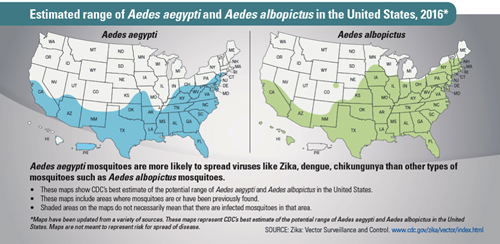Zika in the United States
- By John McLaughlin, John Watson
- 04/22/16
On February 1st, 2016, the Zika virus was officially declared a public health emergency of international concern by the United Nations World Health Organization (WHO).
Zika is now present in 23 countries and is “spreading explosively,” according to WHO’s director-general, Dr. Margaret Chan. Moreover, mathematical models offered by the WHO suggest there could be 3 to 4 million infections caused by the virus in 2016.
Dr. Anne Schuchat, deputy director of the Centers for Disease Control (CDC), recently acknowledged that the Zika virus “seems to be a bit scarier than we initially thought,” changing her viewpoint from January 2016 when she said she expected Zika to cause only “very limited outbreaks” in the United States.
Zika virus spreads to people primarily through the bite of an infected Aedes species mosquito (A. aegypti and A. albopictus), but can also be spread during sex by a man infected with Zika to his partners. Most people infected with Zika won’t have symptoms, but for those who do, the illness is usually mild with symptoms lasting from several days to a week. The most common symptoms of Zika are fever, rash, joint pain and conjunctivitis (red eyes). Severe disease requiring hospitalization is uncommon; however, Zika infection during pregnancy is linked to a serious birth defect of the brain called microcephaly, as well as other problems in fetuses and infants infected with Zika before birth1.
Of interest to campus officials in the United States is the estimated range of infected Aedes mosquitos.

We are now well into the spring semester. Heavy rains have been falling in the south-central and southeastern portions of the United States and warm summer weather, which triggers prime mosquito breeding conditions, is not far off. With 91 documented cases of people infected with the Zika virus in Florida alone2, it is time for campus officials to take a close look at what is being done to harden campus mosquito abatement procedures, and to inform stakeholders (including students, faculty, staff, visitors, summer campers and those in adjacent communities) of both precautions to take to reduce the possibility of infection and actions to take should they suspect they have been infected.
Prevention3
There is no vaccine to prevent Zika. Individuals can protect themselves by preventing mosquito bites:
- Cover exposed skin by wearing long-sleeved shirts and long pants.
- Use EPA-registered insect repellents containing DEET, picaridin, oil of lemon eucalyptus (OLE) or IR3535. Always use as directed.
- Pregnant and breastfeeding women can use all EPA-registered insect repellents, including DEET, according to the product label.
- Most repellents, including DEET, can be used on children aged >2 months.
- Use permethrin-treated clothing and gear (such as boots, pants, socks and tents). You can buy pretreated clothing and gear or treat them yourself.
- Stay and sleep in screened-in or air-conditioned rooms.
Facilities and grounds-keeping departments should recognize that existing mosquito control and eradication efforts focus on the prevention of West Nile virus. The biology and behavior of mosquitos that carry the Zika virus are different, and will require different strategies for control. Following are some actions to consider.
- Coordinate eradication efforts with local or state Vector Management.
- Identify and eliminate breeding sites on campus and in the adjoining neighborhoods.
- On-campus considerations:
- Encourage the local Vector Management agency to place monitoring traps strategically around the campus.
- Repair any low-lying pavement and roof areas that tend to trap water, including gutters and rain barrels.
- Remove and dispose of any materials that can trap and retain water (e.g., old tires, barrels, hubcaps, trash and debris, small and large containers, etc.).
- Inspect all out-of-use trash dumpsters and similar containers; drain and store so that water accumulation does not occur.
- Drain large areas of impounded or standing water and take steps to permit future water to drain.
- For lakes, ponds, fountains and other water features and bodies of water, take steps to eliminate or modify aquatic habitat to prevent mosquito breeding. If habitat modification is not feasible, consider biological control assistance from the Vector Management agency.
- Train and certify/license grounds-keeping staff on larvicide application.
- Visually inspect window screens and repair or replace as needed to prevent entry of mosquitos.
- Inspect the makeup air systems to confirm appropriate filters are in place to prevent entry of mosquitos via building air conditioning systems.
- Repair any leaks or cracks in septic systems and cover all sewer/septic vent pipes using wire mesh with holes smaller than an adult mosquito to eliminate potential breeding locations.
- For off-campus neighborhoods, consider:
- Promoting a campus outreach program staffed by students, faculty, and staff to assist neighbors with the same reduction and elimination activities as those that the campus has undertaken.
As the Zika situation continues to develop across the United States, colleges and universities are encouraged to closely monitor CDC, state and local health department announcements and recommend safety precautions for outdoor events and functions. If hosting events where some guests will likely be coming from outside a potentially mosquito-infected region, consider the value of providing reminders to guests, such as the CDC’s mosquito control fact sheet, which can be found online at: www.cdc.gov/zika/pdfs/control_mosquitoes_chikv_denv_zika.pdf .
John McLaughlin is managing director and John Watson is executive director of Arthur J. Gallagher & Co.’s Higher Education Practice (www.ajg.com/industries/higher-education). Mr. McLaughlin can be reached at 630/285-4380 and Mr. Watson can be reached at 818/539-1445.
1 http://www.cdc.gov/media/dpk/2016/dpk-zika-virus.html
2 http://www.tallahassee.com/story/news/politics/2016/04/19/leon-working-state-prevent-spread-zika-virus/83249288/
3 http://www.clemson.edu/campus-life/campus-services/redfern/zika.html